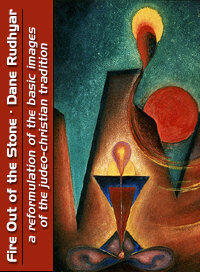 |
| Home | Bio | Art | Music | Literature | Civilization & Culture | Philosophy of Wholeness | Theosophy & Spirituality | Astrology |

FIRE OUT OF THE STONE A Reformulation of the Basic Images of the Judeo-Christian Tradition by Dane Rudhyar, 1962 1. Not to Repeat, But to Renew 2. The Essence and the Substance 3. To Become "More-Than-Man" 4. The Fatherhood of God 5. At the Center is Soul 6. Creation and Evolution 7. Crisis and Sin • Page 1 • Page 2 • Page 3 • Page 4 • Page 5 8. The Coming-Together of God and Man 9. Christ-Love: The Covenant with Individual 10. The Life of Mediation and its Paradox
: : :
This title was first published by Sevire, 1963. Cover for the online edition copyright © 2008 by Michael R. Meyer. : : : : : :
"Thy God is a cosumming fire." Duet. 4:25 "He shall baptize you with the Holy Spirit and with fire." Matthew 3:11 "I am come to send fire on the earth." Luke 12:49
: : :
|

7. CRISIS AND SIN - page 2
"Jesus said unto them: If ye were blind, ye should have no sin; but now ye say, We see; therefore your sin remaineth."
John 9 : 41 Dark BeginningsIn order to face the deepest, because most vital, implications of the concept of the "original sin" or "sins" one must use a psychological approach. But the psychology of which we speak here is one based on the premise that the soul is the central fact of the world of time, change and evolution; and that the soul has a divine purpose and a divine task for which, religiously speaking, it was created in the image and likeness of God. The completion of this task by the soul involves extreme difficulties because of the very character of the task. It involves great risks; and essentially it is God Who takes the risks, for it is God Who emanated the soul as a focus of integrative activity, as an outpost of spirit-unity in a world of material multiplicity and as a center of eternal (eonic) being acting in and through the compulsive and repetitive activities of "life". The risk of evolution is sin. Sin is a negative response of the soul to the task for the performance of which it was created. The soul begins as an infant in spirit and in strength. It emerges out of the subjective state of divine unity and finds itself in a world of incredible strangeness. It seeks to comprehend this world, to orient itself to its inhabitants, to give them "names". It seeks to understand the meaning of change, of time and seasons — indeed of life and death. And in this very act of seeking it becomes different. It learns to perceive objectively and to think. This involves a great risk; and the result is, alas, the original sin in "Eden", the nursery of the soul. Moreover, if we are to grasp the full psychological meaning of the symbolical events recorded in the second chapter of Genesis and traditionally known as the "Fall of man", we should realize that these events constitute only the first Scene of the first Act of the drama of soul-evolution. Two scenes follow which are essentially related to the first — two great tragedies: the crime of Cain, and the wholesale perversion of mankind following the "coming of the sons of God" mentioned in the sixth chapter of Genesis. Indeed it is the whole series of events taking place before the Deluge which establishes the climate of sinfulness, guilt and failure in which the evolution of man's soul and the process of refinement of human nature have had to unfold since the "new start" following the Deluge. Likewise it is the negative results of the shocks, fears and frustrations experienced in childhood which condition the development of personality after the bio-psychological crisis of puberty — a fact which modern depth-psychology has definitely established. Following this most revealing analogy it becomes clear that, in the Biblical narrative, the antedeluvian period of human evolution refers to the childhood of man up to puberty; while the period following the Deluge represents the early years of adolescence. In the story of Abraham and the "descent into Egypt" we have correspondences to the adolescent's involvement in problems of sexual and social-emotional relationship. Moses and the establishment of Israel and the Law represent the first development of the independent and clearly conscious sense of being an "I am"; while the three kings of a united Israel — Saul, David and Solomon — symbolize three stages of development of the ego. The failures of the ego lead to a state of division in the soul, which may amount to a youthful type of "schizophrenia", and as a result to a condition of bondage to external powers — whether personalities or causes. Then, after a series of attempts at reintegration, the coming of the Christ symbolizes the beginning of individual maturity. Man officially comes of age and, after "marriage", should begin to use the "powers of the Fatherhood" consciously and purposefully on his own individual responsibility. Alas, it also happens that "Christ" is rejected; that the soul is crucified by the intellect and the personal nature becomes a "wanderer" in alien lands. Or else the marriage-life runs into deep ruts, and a strenuous conflict develops between the soul (or its frozen reflection!) and the mind-ego. This is the condition which the Western world is now experiencing. The depth-psychologist of our day has shown that if the shocks and frustrations of early infancy can be seen by the grown-up individual in their true character, if the memories of the deliberately forgotten past are brought out of the unconscious into the light of consciousness, a process of liberation can begin. The "ghosts" of past failures can be dissipated when events which outwardly caused these failures are shown for what they actually were rather than for what they seemed to be to the insecure, immature and easily frightened child. The grown-up individual is given a second chance of meeting what has blocked the path of his soul-growth — of meeting it adequately and with the help of the knowledge he has now acquired. What is more he is given the opportunity to forgive himself for his sins — of omission or commission. And this is, psychologically speaking, the absolution which the soul needs; for without this forgiveness the soul cannot freely proceed on its evolutionary path. It is weighed down by remorse or regrets, by guilt or despair. It is haunted by the "ghosts" which the mind constantly re-evokes as it delves again and again into the past in self-imposed punishment and useless misery. The mind may repeat this process consciously; but it may do it as well unconsciously, which often merely postpones the results while making them more acute and destructive of organic health. What occurs in the individual person with a past of failures and sins, human collectivities such as a race or civilization may also experience. Christian man, whether he will admit it or not, is loaded with the sense of guilt which has been stressed and impressed upon his growing soul from childhood on by a collective belief in the original sin and in the inherent sinfulness of human nature. This belief is implied in so many traditions, symbols and stereotyped attitudes, and it is so insistently kept alive by Churches, by radio sermons and even by billboards one encounters everywhere, that it has all the power of a subconscious compulsion. Many violent attempts have of course been made by non-religious modern thinkers to eradicate the conscious belief in man's "sinful-ness"; but what have they offered in its place if not a materialistic and behavioristic version of it, and a feeling of universal meaning lessness which destroys the very belief in the reality of the soul and of God! One does not successfully remove a psychological complex by destroying the conscious sense of individual identity. "The operation was successful" and the patient dead; this does not add up to real healing! It would likewise be senseless to destroy the object or to extinguish the source of light when one seeks to dissipate the shadow which this object casts. What one needs are two sources of light falling upon the object from opposite directions — the direction of God and that of man! What modern man needs so desperately is widespread psychological healing, but a healing in which the soul in man reveals its divine potential even though Christ be the Great Therapist. Indeed, what is needed is a healing implying that self-realized absolution in which not only one sin or another is dissolved, but through which the very understanding of what constitutes "sin" is transformed and renewed. A new understanding, a "renewal of the mind" through a reorientation of man's attitude toward the process and goal of soul-evolution: these are psychological necessities of our times. In the light of such an understanding we can grasp in a new way the meaning of the tragic events previous to the Deluge, according to the Bible — the fall of man from Eden, the murder of Cain, and the wholesale trend toward evil which followed the coming of the "sons of God" and their "marriage to the daughters of man". These three crises should be easily understandable for we have actually experienced them in our own childhood, with varying results; not as literal events of course, but as processes of growth. They refer to: (1) the relationship of the child to his parents and his home, (2) the relationship with siblings (i.e., brothers or sisters), (3) the early phases of the development of self-will and the premature arousal (and misuse) of sexual energies.  Home | About | Calendar | Ephemeris Charts | Art Gallery | Library | Resources Shop | Rudhyar Archival Project | Help Web design and all data, text and graphics appearing on this site are protected by US and International Copyright and are not to be reproduced, distributed, circulated, offered for sale, or given away, in any form, by any means, electronic or conventional. See Notices for full copyright statement and conditions of use. Web design copyright © 2000-2004 by Michael R. Meyer. All Rights Reserved. |